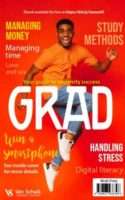As a student in a higher education environment, you will have access to what seems an unlimited number of books, journals, and articles, much of it on the internet. This material can be the result of hours, weeks, sometimes years of hard work by academics in South Africa and globally. They have written down knowledge and insights gained through their studies and research. They are now sharing the fruits of their intellectual efforts with you and they should be acknowledged as the creators and rightsholders.
What is copyright?
What we create through the efforts of the mind is commonly known as intellectual property. It is protected by intellectual property laws, including by copyright laws. Acting responsibly means showing respect for the work of others. Using intellectual property without permission from, and acknowledgement of, the copyright holder, infringes the rights of the creator and is therefore illegal. Illegal photocopying and file sharing fall into this category. It might not seem like it, but copyright theft is similar to shoplifting a pair of jeans off a shop shelf!
Copyright is an exclusive set of legal rights, belonging to the author (creator, composer, artist, etc.). This right is owned for a fixed number of years, to print, publish, perform, film or record literary, artistic or musical material. The right may be assigned to a publisher.
Moral rights are the author’s rights to be identified as the author (the right of paternity). They have the right to object to any distortion, mutilation T P or other modification of the work that would be harmful to his or her honour or reputation (the right of integrity). :
Why is copyright important?
Copyright promotes creativity and learning. It serves the public good. It allows copyright holders – local and international – to earn an income from their work. It helps to protect the value of an author’s work by giving the author the ability to protect it from unlawful, unlicensed or uncredited usage.
What is copyright infringement?
It is illegal to share material that is subject to copyright protection, such as textbooks, short stories, extracts and poems, without the permission of the copyright holder, the author or the authorised publisher. Both the author and publisher suffer financially because of this unlawful downloading.
Downloading and sharing of PDF files of copyright material found on illicit websites are infringements of copyright, and participating in groups where illegal copyright work is being shared is unlawful. This happens for example on WhatsApp, Facebook, Telegram, Dropbox or Google Drive. Copyright infringement boils down to theft!
If you are uncertain, your university librarian can help you decide if something is lawful or unlawful.
Just think! One day you may pass your own intellectual property on to other students and researchers via a textbook or a journal article – you would then hope they treat what is yours with the respect it deserves. It would be your legal right to expect this.
You can be disciplined by your institution for abusing copyright and other intellectual property laws. A university is a place where ideas and research grow and thrive, and it is important to each university to create a safe space for intellectual property to flourish. If you are making money from someone else’s work by selling it without permission, the current Copyright Act makes provision for criminal penalties – a fine (a maximum of R5 000 per infringement) and/or imprisonment of up to 3 years for a first conviction. Publishers and authors have the right to take the necessary action against copyright infringers.
What are the exceptions?
There are exceptions and limitations to copyright. Examples are for • research • educational institutions • criticism or review. Research is increasingly published as open access literature, meaning that it is free of many copyright and licensing restrictions. With all these exceptions the source must still be mentioned, as well as the name(s) of the author(s).
If necessary, get permission from the author or publisher to use copyright material. Never share any illegal online copies of textbooks and other copyright material. Make use of your institution’s library for lawful access to textbooks and other resources.
For more details, read FAQs here.


